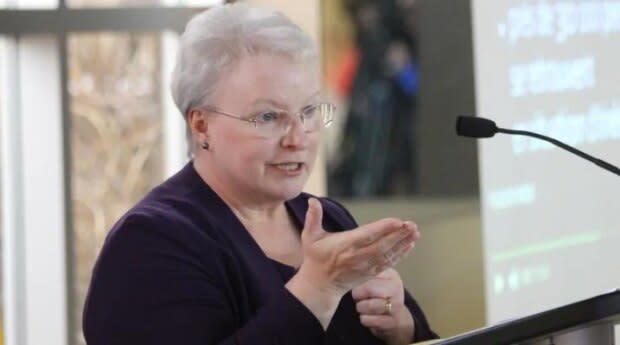Overworked, underpaid and at the breaking point: Personal support worker calls for government aid

Antoinette Calder has reached her breaking point. After months of stress the Deer Island woman is desperately in need of some down time. "I actually called today and told my supervisor I have to take this weekend off," said Calder. "I need a mental health day, I really do." Calder, who is 59, has had just four days off since the COVID-19 crisis hit the province in March. She's worked as a personal support worker (PSW) for the past two years after a long career as a trucker. Home-support workers provide care that keeps elderly New Brunswickers out of hospitals and nursing homes. It's a difficult, physically and emotionally exhausting job that finds her lifting, washing and feeding her clients. She makes sure they take their medications, she picks up groceries and, in one case, even cares for the dog. "It's pretty bad when I have to go to bed at nine o'clock because I'm tired. You eat dinner, do the dishes and go to bed. Nine o'clock and I'm in bed. That's not me."
Calder's sometimes the only emotional support for clients isolated by the pandemic. "We're dealing with older people who are so frightened of what's going on because they know they are high risk and they're watching the news," said Calder. "It's just exacerbating their fears." She feels a responsibility for them, running errands and stopping in on her own time to see how they're doing. But when she's actually on the clock, she's paid $14.80 per hour, only slightly better than minimum wage. She's not paid for the time she's not with the client, has no sick pay and no pension plan.
'Go where the money's at'
Calder works for Home Health Services, a non-profit home-care provider based in St Stephen. But the rate paid to home care PSWs is set by the provincial government. She's worried about where things are going. The population on Deer Island is aging fast and the only other full-time PSW there is a year older than her.

"We need an influx of younger blood into this profession. But when they can go and feed fish or go to work at a grocery store and make more money that we make ... it's a no-brainer. They're going to go where the money's at." But Calder, and many others in her profession, feel no value is being placed on their work. Tina Learmonth, past president of the New Brunswick Home Support Association, echoed that concern. She said if for some reason PSWs didn't come to work one day, the province would shut down. "We can't afford all our seniors to go into emergency rooms, we can't afford everybody to stop working because they need to take care of their parents," said Learmonth. "So we need to place value in the work that this workforce does."
Investment needed
Few home-support workers are men, but Learmonth said she suspects if men had been doing work all along, the pay would be a lot higher than it is now.
Learmonth said the sector desperately needs investment, and the need for higher wages has been acknowledged in ongoing meetings the association has had Department of Social Development officials.
"It's not a matter of us on one side of the table and them on the other side debating whether or not this sector needs more money. They agree. It's just a matter of let's roll up our sleeves and do it, let's figure out how we can make it happen."
Asked if PSWs should be paid more, Social Development Minister Dorothy Shephard said "damn straight."
But it's a question of what the province can afford.
"When we want to give a dollar-an-hour [raise] and we're looking at a $24- or $30-million bump, we have to be prepared for that," said Shephard. "It doesn't mean that we cannot continually keep trying to do so, and we will continue to."
Slight raise coming
Workers in the sector are scheduled to get a 50-cent-an-hour increase Nov. 1. A temporary increase in pay is on the way thanks to a federal COVID-19 benefit aimed at front-line workers.
It will provide $500 a month backdated to the beginning of the crisis for a maximum total payment of $2,000.

Calder has another suggestion: Boost PSW salaries to where they should be — about 30 per cent higher — and create an education program to attract young people into the field, a program offering training and credits they can later build on to move into careers like nursing.
She's written letters raising her concerns and suggestions to several of the province's MLAs.
"I want to hear are you going to help us or not?" she said. "And I got zippo. Zilch. Nothing. I'm tired of this rhetoric. I'm tired of them not listening to us. I'm tired of it."

